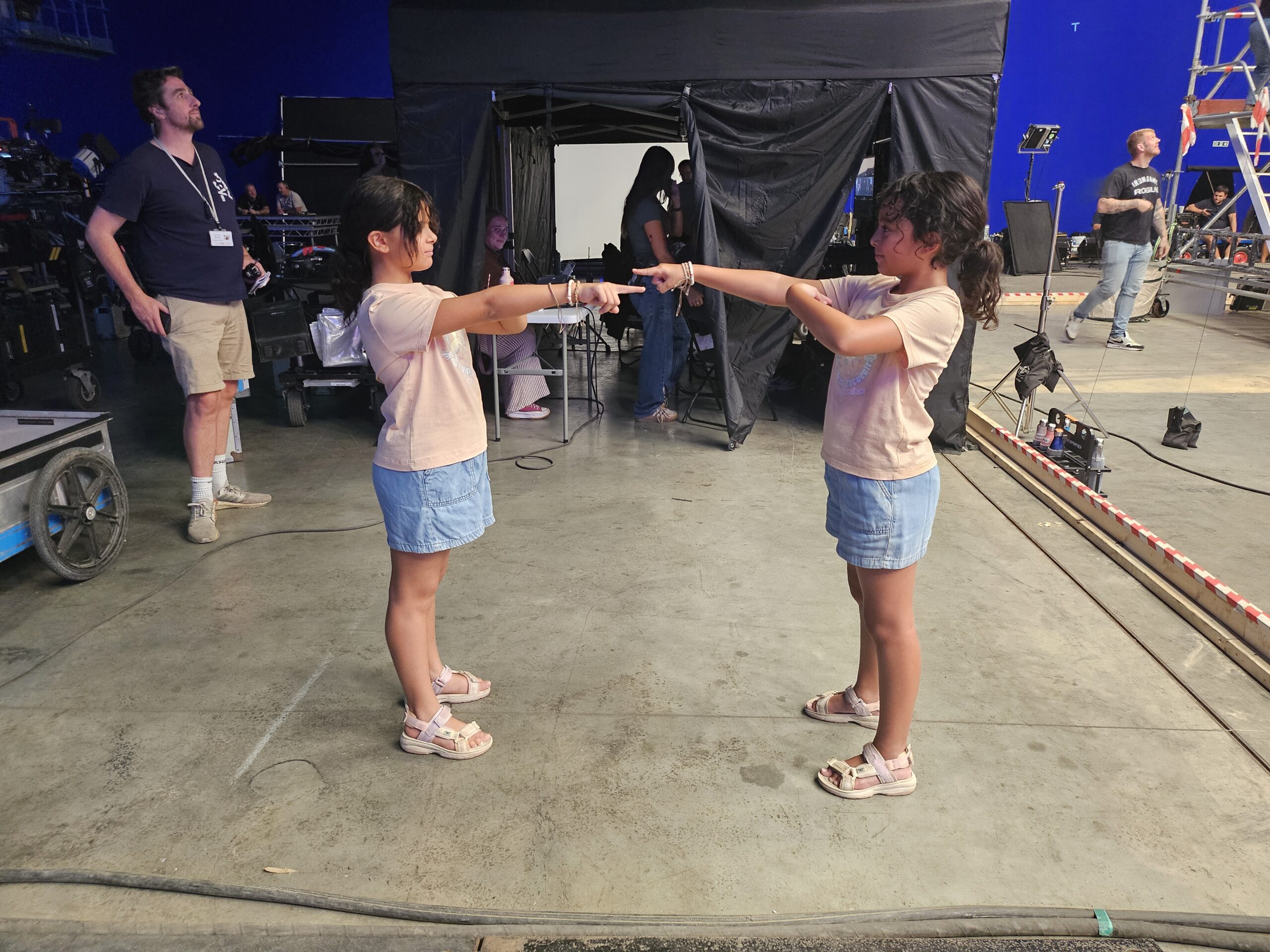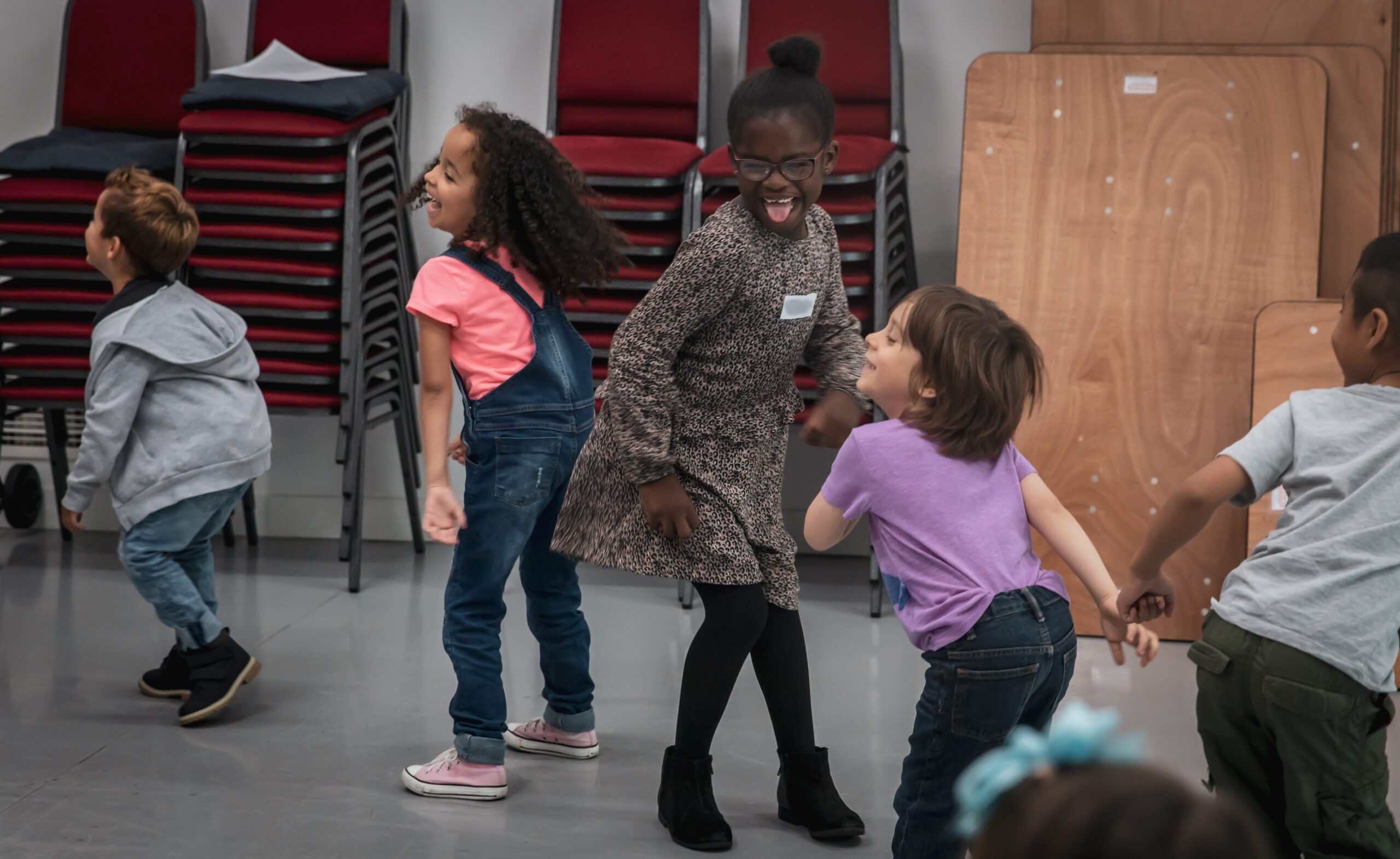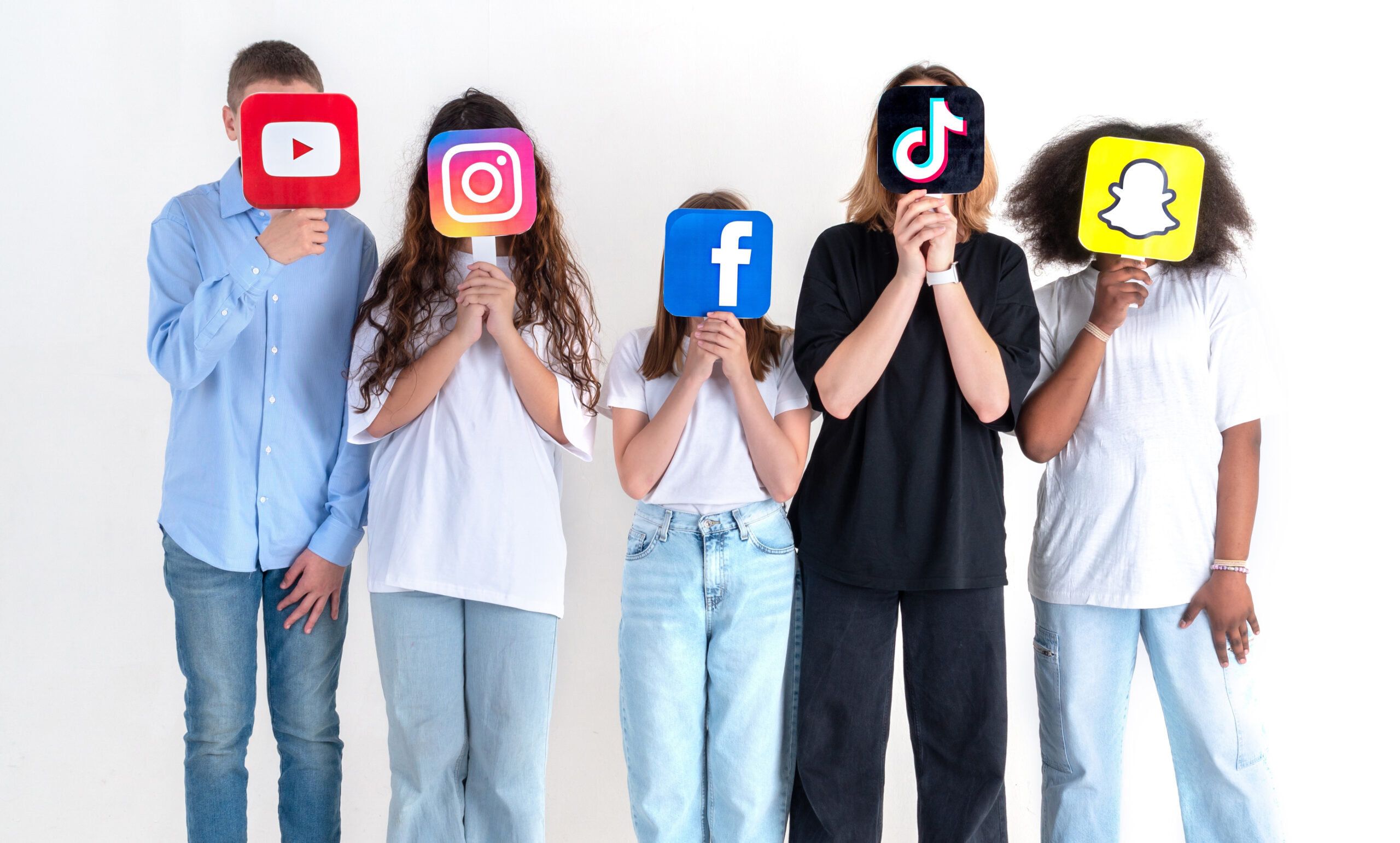A young actor and a parent chaperone reveal the unique and often challenging realities of body doubling on a blockbuster film like ‘Jurassic World: Rebirth’.
Working on a blockbuster film like Jurassic World: Rebirth is a once-in-a-lifetime opportunity for most people, especially a young actor. But this is exactly what Amber Joshi got to do as she received her first professional film credit as a body double for co-star Audrina Miranda.
We sat down with Amber and her father, Ajay, who chaperoned her throughout the three-month shoot, to talk about their experience working alongside well-known actors like Scarlett Johansson and Jonathan Bailey. Together, they take us behind the scenes of what being a body double entails, how they manage Amber’s schooling while on set, and their top tips for other young actors and their parents or guardians for embarking on a similar journey. Here’s what they shared:
Amber and Ajay’s body doubling and chaperoning insights:
- Manage your own expectations, as set life for a body double involves significant downtime and a lot of waiting.
- Be assertive and confident in advocating for your needs, like requesting breaks or verifying work hours, as production schedules can be unpredictable.
- Learn how to build beneficial relationships with crew members, such as the hair and make-up team, to get valuable insights and help you navigate the set.
Hi, Amber! What made you want to try acting?
Amber: My sister’s three years older than me, and she’s always wanted to be an actor. She loves singing, dancing and anything to do with being on TV or on stage. When she was seven, she started acting, and I would sometimes help out with the self-tapes for the auditions. That got me thinking, “Oh, this looks fun.” Then I started acting as well.
What did you have to do for your audition for Jurassic World: Rebirth?
Amber: [I] did a self-tape first and had to send a video of me swimming.
Ajay: The only thing we knew at that point is that the child had to be good at swimming. They don’t tell you what it’s for. It might have said something about a film, but it was quite low-key.
Amber: After we sent the self-tape off, we got a call back for an in-person audition at Elstree Studios.
Ajay: That’s when they said the role was as a double.
Amber: There were five other girls there as well. We met one of the stunt people and we did some stunts and exercises. We had to pretend we were being chased by a dinosaur and fall into a mattress and pretend there was a massive dinosaur there, so that was interesting.
After, we got split up and taken to the hair and make-up people. They measured and put cling film on our heads to make a shape in case they needed to make a wig for the person. Then, individually, we got taken into a room where we met the director [Gareth Edwards]. We read a script with him, and he told us a bit about the film and what we’d be doing.
Ajay: By this point, I’d had to sign an NDA. That’s when I found out what the film was. I started getting calls saying, “We need to check her height,” because they’d measured her as a certain height and we’d submitted a different number. They said, “Can you measure her when she’s back from school. These two inches will make or break whether she gets the role or not, because she needs to be the same height as [Audrina Miranda].” So we had to take pictures and WhatsApp them to the production team so that they could validate that she was that height. About an hour and a half later, they’d made an offer.
At that time, we didn’t know that much about it, but it required us to leave in about two weeks. We were going to be away for three months – two months in Thailand and a month in Malta, then the following month back in the UK. I was going as the chaperone, so you go through a lot of different questions in your mind: Will my wife be okay? The girls have a roller-skating competition on this date and a synchronised swimming competition on this date, and all that kind of thing.
Were you excited when you found out you’d be working on a major production like Jurassic World: Rebirth?
Amber: Yes, very. I was like, “Oh my god, this is the biggest thing I’ve ever done.” It was quite exciting!
Ajay: The difficult thing was that, because of the NDA, we were under extremely strict instructions not to say anything to anyone.
Amber: With school and stuff, it was quite hard. I had to tell people I wasn’t going to be there, but I couldn’t tell them why. My friends were all very confused.
Ajay: There was a lot that had to happen in a two-week window. They had to get a visa and a working visa for her, and in order to do that, they had to go to a high court judge and do a medical examination.
With things like insurance, normally, you go on holiday and you have insurance, but the normal type of insurance won’t cover you for that duration of time. What happens if we’re not on set and she treads on some glass on the beach? I bought a separate insurance policy that covered both of us. Those are the sort of things that go through your mind before you’re leaving for such a long period of time.
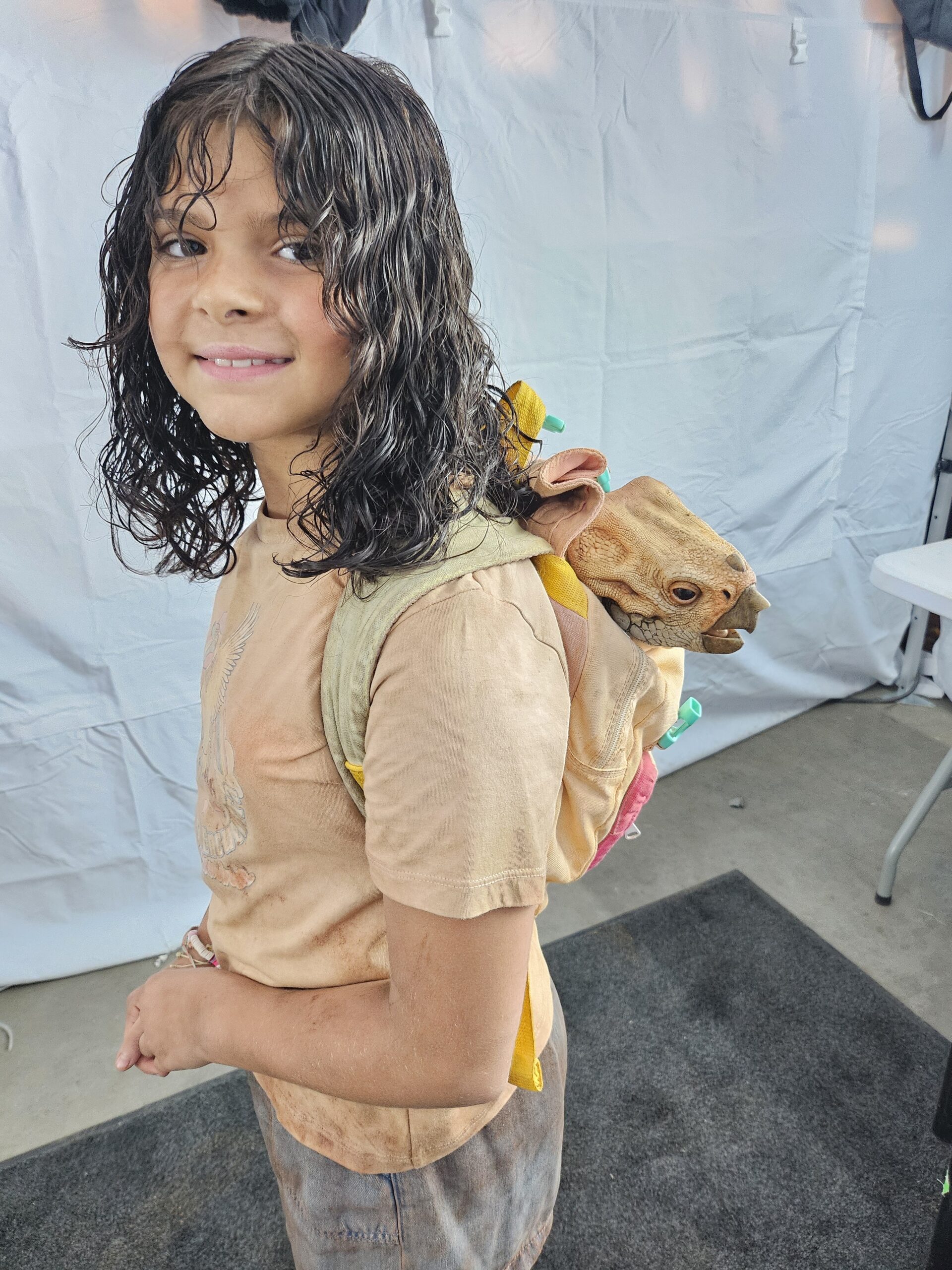
Image credit: Ajay Joshi
How did you manage the demands of balancing a shoot schedule with schooling and rest?
Amber: Since I left during the holidays, I didn’t really have anything going on the first two days. We flew out and, when we got there, we met the tutor at the airport. When we got to the hotel, she talked to us about what was going to happen and how it was going to work.
The funny thing was, the production didn’t have a room for the tutoring to happen in when I wasn’t on set. I had to have at least three and a max of five hours of tutoring each day, except for Saturday and Sunday. At first, we did it in my dad’s room, because it had a desk. They moved us into Mahershala Ali’s suite when he left. It was three massive rooms right next to each other with interconnecting doors.
Ajay: It’s part of the licence agreement that they have to provide a tutor. The tutor is paid for by the production company, so they do have a responsibility to the child, but at the same time, their responsibility is also to the production company. I struggled a lot with that because you’d only get told, maybe the morning of each day, how long she was going to be tutored for. It could be, “Okay, Amber’s going to do three hours today, or we can do five hours and see how it goes.”
Obviously, that’s a very different environment from being in school. In school, you’ve got other children. There were only two children on the entire set. Amber’s school in St. Albans were wonderful though. They created a whole teaching plan on Google Classroom and called it ‘Amber’s Hollywood Homework’.
How did you deal with boredom on those days when you weren’t needed on set?
Amber: My parents bought me a Kindle so I wouldn’t have to bring loads of books with me. That was really helpful. I could just sit down and read. Annoyingly, for my dad’s sake, I had downloaded a lot of riddle books. So every break, I would be like, “Hey, Dad, what’s the answer to this riddle?” Sometimes we would play card games in our spare time.
Ajay: We’re lucky she was patient, because you’ll find that there’s a lot of waiting and a lot of not knowing. You’ve got to be on standby pretty much the whole time in case someone knocks on the door. The hair and make-up team were brilliant. They were very insightful in terms of, “We think you might get some action on this day, but probably not on that day.” That became our routine – every morning, she would go to hair and make-up, have a really nice chat with the team there, and then you just waited to see how the rest of the day turned out.
My wife said, “You need to go and visit animal sanctuaries,” but in Thailand at that time of year, it was extremely hot and then it was monsoon season. It was a very physical shoot, because you’re 10 miles out to sea, or you’re in a jungle, or you’re in a quarry. It’s either really hot or really wet and then it would get dark by about 6:15pm. I was trying to keep Amber to a schedule of going to bed by 8pm, because you could get a WhatsApp at any time in the evening saying, “Tomorrow you’re being picked up at this time.”
At the same time, you want her to be a child and have some time in the pool and build a bond and relationship with Audrina. Luckily, the girls got on really well, so that was nice to be able to bond with Audrina’s mum, because compared to everyone else, it was a different experience for us.
What kind of things did you have to do as a body double?
Amber: The main shots that I was in were ones focused on other characters, and normally, it’s just the blurred character in the background or the top of the head. Mainly, they did drone shots where it was from far away, from behind, from in the water. So, you can’t at any point see my face. And if you did, they would put Audrina’s face on my face and merge it. It was quite fun getting to know all the other actors. We got along quite well, but when I wasn’t working, I would be sitting in a tent or a trailer waiting to see if I was needed or not.
Ajay: A lot of the time, she was used to set the camera up. By the time we were in Malta, they were saying, “Okay, time for the B team to come out.” There were loads of other types of doubles and stunt doubles, and every location we went to, you had different people in the same costume wandering around. You had to work out which one was Scarlett [Johansson] and which one wasn’t.
They’d call Amber first, get the scenes and the cameras all set up with other people, and then she’s released and Audrina steps up. It’s fascinating because obviously, they looked pretty much identical throughout it.
Did you get to meet Scarlett Johansson or Jonathan Bailey while working on set?
Amber: Yeah. I met them when we were doing rehearsals. I didn’t really do any main shots with them. They were all really nice. One time, Scarlett came with her kids to our hotel, and I hung out with her daughter, who is a similar age to me, and we got along quite well.
Ajay: Yes, we fortunately did get to meet Scarlett and her family. They were all lovely and she was very down to earth. Once we got back to the UK, there was a lot more time spent as a collective. That’s where you get to see the different characters of Jonathan and Scarlett. She was exceptionally generous in terms of providing food trucks for the entire crew, pretty much every week, for free. All of the other actors contributed, too.
Are there any funny or memorable moments from the shoot you can share?
Amber: We were filming the cave scene, and we were all swimming. I think someone who was in the water said something funny, and we were all laughing. And one of the main characters was next to me, and he was struggling to swim, and I thought he was about to drown. So I put my hand underneath his chin and kept on swimming with my hand underneath his chin. He said, “Thank you. I would have drowned.”
Ajay: It became a running joke. Every time Manuel [Garcia-Rulfo] saw Amber, he said, “Amber, you saved my life.” He’s six-foot-two, so I’m not entirely sure that she saved his life.
Amber: I did.
Ajay: We were out at sea past Valletta, and we’re basically just sitting on this trawler-type boat. It’s really hot, and you’re just bobbing around, waiting for someone to call you onto the actual boat that they’re shooting on. We quite enjoyed being on those boats, because you got to talk to other people. The rest of the time, whether it’s a night or day shoot, you’ll basically eat in your trailer or a tent. You can’t wander around because they need to know where you are at all times, so it’s just the two of you. So being on that boat was quite nice.

Image credit: Ajay Joshi / Amber on the set of ‘Jurassic World: Rebirth’
What are some of the challenges of working on a large-scale production like Jurassic World: Rebirth from a chaperone’s perspective?
Ajay: As a chaperone, you have to be really conscious of all of the different rules and license agreements. The production team were great, and they were very conscious of it too, but ultimately, she’s your child and you’re responsible, so you need to be the one to make sure that she’s comfortable with what they’re asking her to do.
You do feel like you’re forgotten about sometimes, because it’s such a big project. So, you do need to make sure that you are consciously checking to say, “Can we have lunch now?” You can’t assume that they’re going to come and remember that you’re sitting in a tent or a trailer.
Creating that expectation management with Amber about what each day was going to involve did become quite challenging. It might be that I get the WhatsApp after she’s gone to bed, so she’s gone to bed not knowing what the next day is going to be for her. That became a bit challenging, particularly when they were trying to bank as many tutoring hours as possible just in case they needed her on certain days for longer.
You need to be able to consciously track that, because sometimes the tutor will provide spreadsheets to the production team, but not to you. So, you need to be writing down how many hours they’ve done, and then having the conversation to say, “Hang on, we’ve done almost 25 hours this week. That’s the maximum you can do. What’s the plan for next week?” You’ve got to be quite assertive in that respect.
What has the experience taught you? Would you accept other body double roles in the future?
Amber: It depends what it’s for. I liked it, but there was a lot of waiting around and sometimes I didn’t even do anything. The tutoring was quite boring because it was literally just me and another person, and there was a glass window [in our tutor room] that looked right into the pool, so you could see everyone else swimming while you’re doing your tutoring. That was very tempting.
Ajay: If someone’s really keen to explore what the scale of a production is like, then it’s a really good way from a relatively low-pressure perspective to see the scope of what’s involved. I’m not giving too much away, but there were not many dinosaurs that we actually shot with. It’s all tennis balls on a stick type thing. So you see the nuts and bolts of what really happens. It’s a lot of waiting, and you are a very small piece in a very big cog. So, if your child is capable of doing that, then it can be a really eye-opening experience for the industry. But if they’re not, then that becomes a bit of a nightmare.
On the flip side, it could give you a real taste for it. When other jobs have been coming in, Amber has been saying, “I only want to do this if I’m actually involved in it.” It creates a tremendous amount of confidence for the child. You’ve got your eyes open to what it will entail.
If you go into it thinking, “This is amazing, it’s a Hollywood film, I’m going to do loads of acting and be at the centre of it all,” it could be a bit of a shock to the system. You’ve got to understand what your role is. It’s an important role because they couldn’t have done it without her, but at the same time, the priority is going to be the actor that they’ve actually cast.
What advice would you give to other young performers to prepare for the experience of being on set?
Amber: Don’t be too overly excited all the time, because the more you’re excited, the more you might be disappointed if you don’t do anything. Bring something on set that you can do in your spare time so you’re not just sitting around doing nothing. And be prepared that you won’t always do something, you might do so much, and then you might not do anything the next day. It’s very varied and you’re very on the edge. You don’t know what’s going to happen until the very end of the day.
What advice would you give to other parents of young performers about being on set?
Ajay: It’s this weird dichotomy of having control, but then at the same time having no control. You’ve just got to be on it as much as you can and develop the relationships with the people who have the information. We created some really good friendships with the hair and make-up team. They’d all just finished Gladiator II, so they’re going, “Wait until you get to Malta. That’s going to be a different type of heat.” So, they help you navigate through the lack of control.
Packing was quite an interesting thing, because I’ve never had to go away for three months before. You’re going to need lots of clothes for the jungle, for beaches, for swamps and things like that. And then, obviously, you’ve got to navigate washing, getting stuff sorted out behind the scenes. In Malta, it was extremely expensive to get anything washed in the hotel, so we just bought washing powder and did it in the bath. You learn little hacks that you wouldn’t normally have to do when you’re at home.
How do you advocate for Amber’s needs during filming?
Ajay: If there are things that you’re not comfortable with or your child’s not comfortable doing, you have to say. There was a lot of physical stuff on this project. Amber would be in caves and out at sea and on boats. So you need to maintain that honesty with your child and have the relationship in order to be able to say, “I’m not sure.” That didn’t have to happen on this shoot as much, but you just need to always be conscious and thinking about that.
Some of the difficulty comes when you’re called to go on set. Children will be really familiar with the script and the scenes and the ones that they’re in, and they can work it out faster than the adult can about whether they’re actually going to be needed or not. Then you get, “Hang on, they’re doing a different scene. I’m not going to be needed, Daddy.” Trying to keep spirits up in that respect is quite important.
Don’t be afraid to have conversations with people, saying, “When are we being wrapped?” You need to figure it out yourself from when you’ve got onto set and then work out the hours, and the licence is different for whether it’s a night shoot versus a day shoot and what time you started. So you’re clock watching to make sure that you’re not being taken advantage of, which didn’t happen on this, but I think that’s the stuff that you need to go into with your eyes open.
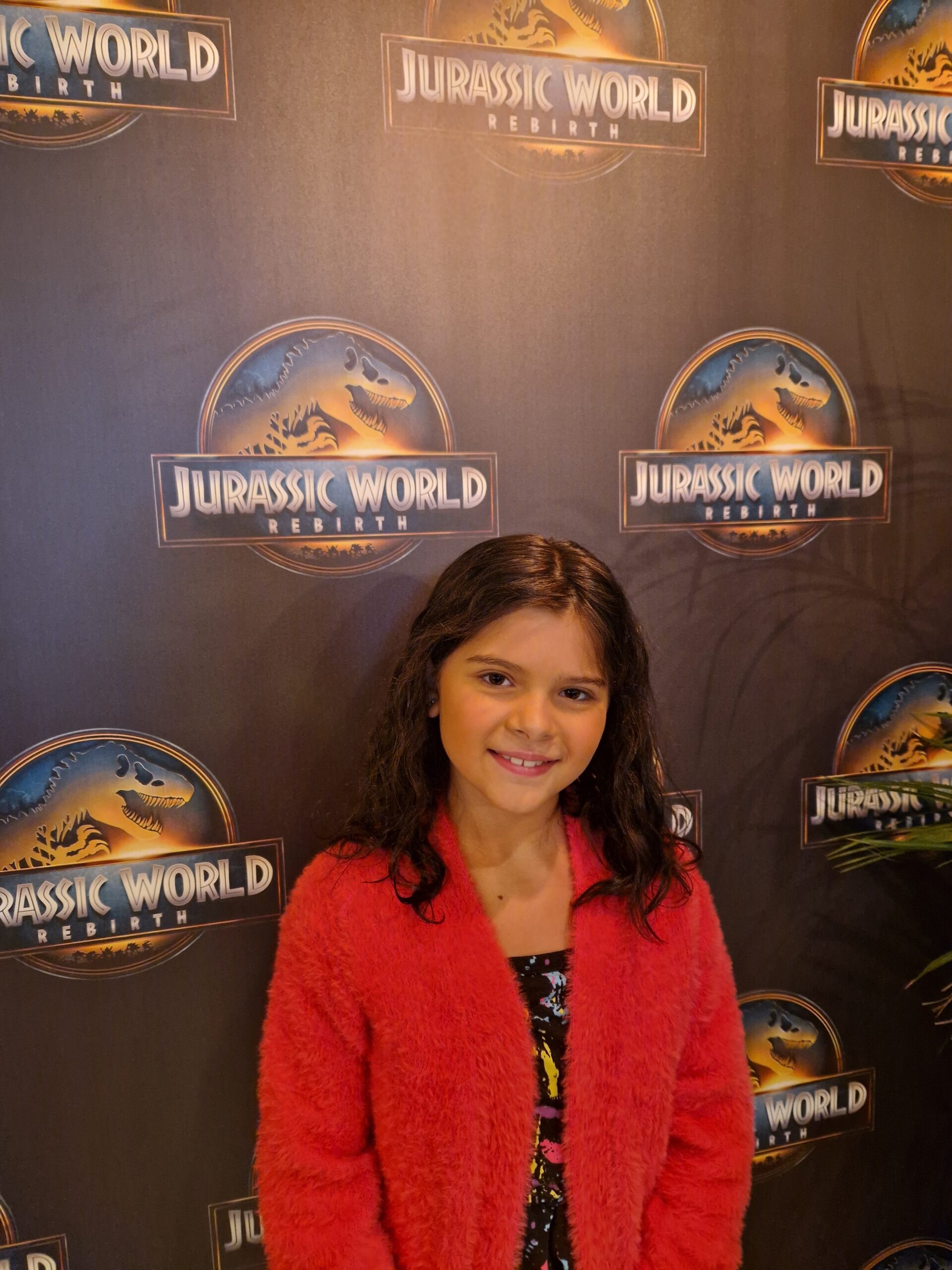
Image credit: Ajay Joshi
Finally, what would be your dream role?
Amber: I prefer plays to on-screen acting. With plays, you do it one time and it’s final. With screen, you can redo it and redo it and redo it. There’s less pressure, but it’s less magical. I would love to be a main character in the future so I can use my experience from this production.
Actionable Insights
From navigating auditions and NDAs to managing downtime on set, Amber and Ajay’s story provides a realistic look into the industry, highlighting the importance of preparation, patience, and perspective. Here are some of their top tips for new performers and their parents:
- Bring something to do: Set life involves a lot of waiting. Bring a book, a game, or anything to occupy your time so you’re not just sitting around.
- Be patient and manage expectations: Understand that your role, while important, is one small piece of a huge production. Don’t be disappointed if you don’t get much action; waiting is a big part of the job.
- Stay adaptable and assertive: You might not always know the schedule in advance. Be prepared for last-minute changes and don’t be afraid to advocate for your own needs or breaks.
- Build relationships: Making friends with the crew — especially the hair and make-up team — can provide you with useful information and help you navigate the chaos of a large set.
A massive thanks to Amber and Ajay for sharing their amazing experience with us!
‘Jurassic World: Rebirth’ is available to digitally buy or rent now.
Take a look at our website for tips and advice for young performers and parents, and more interviews and casting stories.
